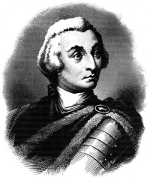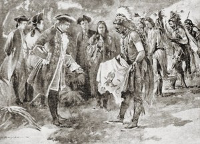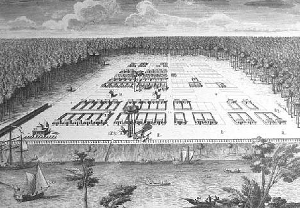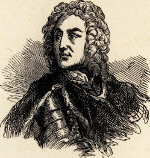James Oglethorpe: Georgia's Founding Father
James Oglethorpe is most well-known as the founder of the Georgia Colony, one of America's original 13 Colonies. 
Oglethorpe was born on Dec. 22, 1696, in Yorkshire, England. He grew up in the small Surrey town of Godalming, near London, and attended Eton and then Corpus Christi College, at Oxford. After a brief stint in the military repelling a Turkish invasion of Europe, he began a career in the House of Commons, following in the footsteps of his father and his two brothers. He early gained a sympathy for debtors. Robert Castell, a friend, could not pay his debts in 1729 and was thrown in jail. Castell couldn't pay his prison fees and so had to share a cell with another prisoner, who had smallpox. Castell got the disease and died from it. An incensed Oglethorpe campaigned for better conditions for British prisoners. He was at one time chairman of a committee on prison reform. At the same time, Oglethorpe and Sir John Percival began planning for a new colony in North America, to which poor people could be sent as a means of starting a new life free from debt or want. The movement gathered momentum and some influential backers, and King George II approved the charter for the colony in 1732. The residents named the colony after him. 
Oglethorpe and more than 100 other colonists set sail aboard the ship Anne. They arrived in what is now Savannah on Feb. 12, 1733. They had first landed at Port Royal in South Carolina and then had journeyed south overland until they reached the Savannah River. Oglethorpe and Tomochichi, chief of the Yamacraw tribe, made an agreement, and the result was the Georgia colony. Onboard the ship with the colonists were some cotton seeds from the Chelsea Medicinal Garden in London. The Georgia colony proved to be amenable to growing cotton, as did other colonies in the Deep South. 
Among the tenets of the colony's original charter–insisted on by Oglethorpe–were religious freedom and a ban on slavery. As a result, Georgia had a small Jewish community, in Savannah; also as a result, slavery came late to the Georgia colony. The growth of the Georgia colony was punctuated by moments of strife. In 1739, the War of Jenkins' Ear began, pitting England against Spain. Oglethorpe and the regiment that he had been given to protect his colony cobbled together an invasion force that included Native Americans and some Carolina Rangers, seized two Spanish forts, and then laid siege to the Spanish fortress at St. Augustine. The attack faltered, and the English force dissipated. The Spanish counterattack came at St. Simons Island, against Fort Frederica. Oglethorpe, who lived on the island, led the Georgia militia's victory in the 1742 Battle of Bloody Marsh. Oglethorpe was considered a national hero in England, and King George II promoted him to the rank of brigadier general. 
Oglethorpe made a few enemies during his lifetime. One of them, a fellow officer, accused him of treason in 1743. He eventually cleared his name. He married Elizabeth Wright in 1744, and the couple lived in Cranham, a small town in Essex. Oglethorpe mingled with London elites including Samuel Johnson (publisher of a famous dictionary) and Oliver Goldsmith (famous playwright). Oglethorpe took up arms again in 1745, this time on English soil, to defend against an invasion by forces loyal to Bonnie Prince Charlie. He later faced a court-martial and again, as with the charges of treason, had his slate cleared. Even though he was considered the Georgia colony's founder, he was only one member of the Board of Trustees and he didn't live there anymore, so he had no power to stop the advent of slavery in the colony; as a result, he resigned from the board, in 1750. He served in Parliament until 1754, when he lost his campaign for re-election. The senior general in the British Army, he fought for a time in the Seven Years War, returning to England in 1760. He did not fight in the Revolutionary War but did, in 1785, meet with John Adams, the first United States Ambassador to Great Britain. Oglethorpe died on June 30, 1785. He was 88. |
|
Social Studies for Kids
copyright 2002–2026
David White




